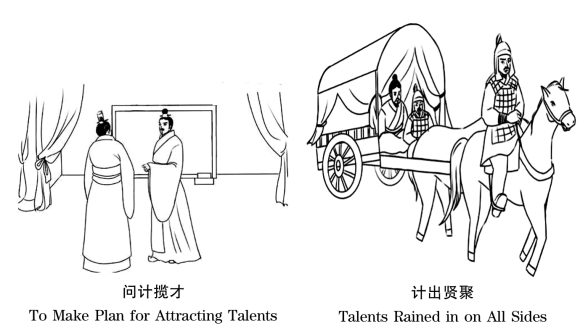《礼贤下士》出处、故事、英文翻译、注释
29.礼贤①下②士③
lǐ xián xià shì
①贤:贤士,指有美德、有才干的人。
②下:谦居于别人之下,以示对人的尊敬。
③士:旧指有知识有学问的人。
【出处】《新唐书·李勉传》:“其在朝廷,鲠亮谦介,为宗臣表,礼贤下士有始终,尝引李巡、张参在幕府。”《宋书·江夏王义恭传》:“礼贤下士,圣人垂训;骄侈矜尚,先哲所去。”
【成语故事】战国时期,中原形成了七个实力最强的诸侯国,分别是齐、楚、燕、韩、赵、魏、秦,它们被称作“战国七雄”。公元前314年,燕国几乎在诸侯争战中被齐国消灭。燕昭王在危难中继位后,决定要重振燕国,而重振国家的关键就是要招揽各方面的人才,为自己所用。为了招募人才,他任用能干的贤臣郭隗为丞相,并设立了招贤馆,又在易水建造了黄金台,用黄金来吸引和招揽天下各路人才。消息发布不久,各路文人和武将都来到黄金台,一显才能。就这样,燕国吸收了很多人才。经过二十多年的励精图治,燕国终于日渐强盛。公元前284年,燕昭王诏令手下大将乐毅联合并统率赵、楚、韩、魏、燕五国的军队,大举攻打齐国,一连攻下七十多座城池。齐国战败,齐缗王仓皇逃亡,在逃亡的路上被楚军杀害。燕国也终于洗雪了当年的国耻,国家实力也变得更加强大。
【寓意】该成语原意是指君主或高官因重视人才而降低自己的身份主动前去结交,敬重那些身份低下的贤能有才学之人,以期能成为朋友,为己所用。现喻指有身份的人不计身份的差异对贤德有才之人表示尊敬和重视。

礼贤下士
To Respect and Favor the Talents
29.To Respect and Favor the Talents
【Idiomatic Story】During the Warring States period,there formed seven State Kingdoms in the Central Plains area of the ancient China,including the Qi State,the Chu State,the Yan State,the Han State,the Zhao State,the Wei State and the Qin State.They were known as the “Seven Powers of the Warring States Period” in history.
In 314 BC,the Yan State was almost extinct in the wars with the Qi State.In such a critical moment,the King Zhaowang of the Yan State succeeded to the throne.Then the king made up his mind to revitalize the Yan State and he knew the key was to attract and accept talents.
In order to attract more talents to the Yan State,the King Zhao-wang of the Yan State appointed the capable statesman and consultant GUO Kui as Prime Minister,and he instructed to establish the talents-seeking bureau and build the Gold Showing Stage in Yi-shui to attract capable men with talence.
Not long after the news being released,various scholars and martial talents from different places came to the Gold Showing Stage to show their capabilities and competences.
In such a way,the King Zhao-wang of the Yan State had attracted and admitted many talents to serve for him and his State.The Yan State gradually grew into a powerful and influential State with the development of about two decades.
In 284 BC,the King Zhao-wang of the Yan State appointed YUE Yi as the General to command troops for attacking the Qi State by joining hands with other four States,including the Chu State,the Han State,the Zhao State,and the Wei State.
YUE Yi commanded the allied forces of the five States to launch a large attack onto the Qi State.They captured over 70 cities of the Qi State successively.The Qi State was completely defeated.The King Min-wang of the Qi State escaped in panic,but he was killed on the way of escaping by the soldiers of the Chu troops.The Yan State had taken its revenge on the Qi State for being bullied and humiliated before.From then on,the Yan State became much stronger and more powerful.
【Implied Meaning】It originally means that the emperor or high officials humble themselves to show their friendliness and favor towards the talents for fully exerting the competence and potential abilities of the talents.Now it is often used to refer to those gentlemen or gentlewomen showing their respect and value towards the talents regardless their own social status.








